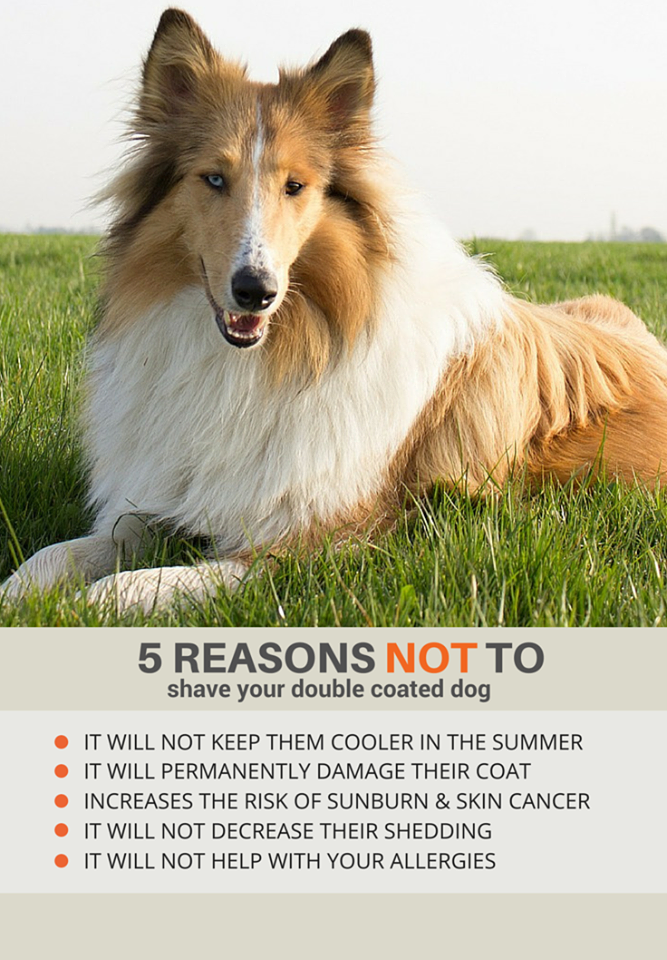As a professional dog groomer, there are a large number of double coated breeds. We meet many dog owners asking if their dog coat is too long or too hot for them, and if we can shave or clip them. Dogs do not cool down like humans, and clipping or shaving them brings more harm than good to double coated breeds.
These dogs have two layers of fur, and both layers are just as equally important. These layers should and SHOULD be maintained as they originally were. The bottom layer is known as the undercoat, these little fur are fluffy, soft and very short. They do a good job at insulating the dog by trapping air around them and help maintain an optimal temperature for your dog.
Some double coated breeds: Labrador, Golden Retriever, Husky, Australian Shepherd, Japanese Spitz, Border Collie
Here’s a collection of tips for grooming your double coated dog:
- To remove loose and dead hairs from your dog’s undercoat, use an undercoat grooming rake.
- The fur is thicker and longer on your dog’s butt, so you’ll need to use a slicker brush.
- To prevent mats and tangles, you need to brush your dog at least two or three times a week.
- To remove dead and loose hairs from the top coat, go over your dog with a wire pin brush or comb.
- Work through mats and tangles with a wide-tooth comb. If you have to cut one out, pinch the fur as close to your dog’s skin as possible to prevent accidentally cutting his skin.
- The last step is to go over your dog’s coat with a bristle brush to improve shine.
How the undercoat works!

Here are a few of our favourite dog grooming tips!
1. Shedding
Clipping your dog will NOT help with shedding. Some double coated dogs shed once to twice a year and by clipping them, some owners assume that their dogs will not shed. They will still shed and soon you will notice short, newly clipped fur all over your house. One way to control shedding is to de-shed your dog properly and thoroughly during shedding season or do it every few weeks.
2. Keeping them cool
Dogs do not sweat and they do not cool themselves through their skin. Dogs cool themselves by panting and through their paws. Their coat helps to keep them cool during warm weather. Clipping your dog allows their skin to be directly exposed to the sun, and this increase the likelihood of sunburn and heatstroke
3. It will grow back.
No, sadly it will not grow back. By clipping your dog, the topcoat and the undercoat loses their originally layering and both layers will be of the same length. Most of the time the undercoat grows faster than the topcoat and there is almost no chance for the topcoat to ever catch up and create a distance between the two coats again.
Some owners think that over time and under the magical hands of a professional groomer the dog’s coat can be magically turned back into the way it was. If you are lucky, your dog may get a coat that is ALMOST as harsh as its original topcoat, but there will still be little to no undercoat, leaving the dog with just 1 layer of semi topcoat that does only 50% of the job the original topcoat is supposed to do.
It will alter their coat for the rest of their lives.
4. Maintain
A double coated dog typically has a topcoat that is bright and fresh in colour, and very, very attractive. The undercoat is non shiny, and usually matte in colour. Giving your double coated dog a good de-shed Shampoo and Conditioning with a great brush out will help maintain the beautiful coat, keep them cool/warm and allow their coat to breathe plus you will have less loose hair around the home and in your car.
Call on Friends with Fur
Some think that only show dogs need to be groomed properly and we beg to differ. A breed standard is there for a reason to make sure dogs of their own breeds can perform what their breed standard is set out to be, call Friends with Fur in Brisbane Southside to take care of your double coated breed 3393 9351
